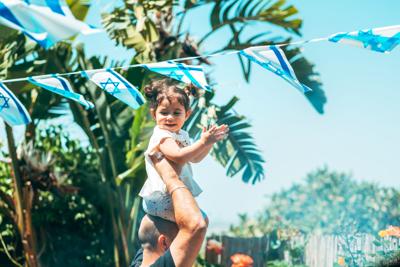I was recently reading a novel ( "Shark Dialogues" by Kiana Davenport ) while preparing for a trip to Hawaii when a character said that she was “thinking of all of the lives lived that had brought her to this point.” All of the lives lived that brought us to this point: There are several ritualized ways in which Judaism encourages us, regularly, to think of just that. We observe the Yahrzeit (annual anniversary) of a loved one’s passing by lighting a memorial candle, making a donation of tzedakah (a charitable gift) and reciting the Kaddish prayer.
But why memorialize the sad occasion of a loved one’s death as opposed to the joyous occasion of their birth? Midrash Kohelet teaches: “King Solomon has said: The day of one's death is better than that of his birth. When a human being is born all rejoice, and when he dies all weep. But it should not be so.

Rather, at one's birth no one has yet cause to rejoice; for no one knows to what future the babe is born, what will be the development of his intellect or of his soul, and by what works he will stand; whether he will be a righteous man or a wicked man, whether he will be good or evil; whether good or evil will befall him. But when he dies, then all ought to rejoice if he has departed leaving a good name, and has gone out of this world in peace.” When we observe a loved one’s Yahrtzeit, we remember the fullness of the life they lived and link their life, with gratitude and appreciation, to ours today.
While Yahrtzeits occur annually, the Jewish calendar provides four opportunities each year to observe Yizkor, a worship service that provides the framework for the community to remember all of its loved ones who have died with memorial prayers. Traditionally, this special service of memory is connected to four Jewish holidays: Yom Kippur, Sukkot, Passover and Shavuot. On Yom Kippur, the theme of the day reminds us that every life hangs in the balance.
As we pray that the souls of our loved ones are at peace, we also pray that their memories might inspire us to live our lives, so long as they are ours to live, most fully and righteously. In ancient days, the three harvest festivals were the times of greatest communal and family celebration — celebrations that simply wouldn’t be the same when those who were such a big part of them were no longer there. For that reason, KKBE has added a Yizkor service during the week of Thanksgiving — a chance to reflect on the memories we made with our loved ones at this widely celebrated family holiday, the traditions we created with them and all of the holiday celebrations that have had such a big hand in making us who we are today.
And the custom of bestowing Hebrew names that honor loved ones no longer with us allows us to remember them at all sorts of times all year long. When we name a baby with a Hebrew name identical to or connected to that of a loved one, we aren’t just hoping that their name will carry forward into another generation; we hope that their attributes will be carried on, as well. We know, of course, that every child will grow to be their own unique person, but as they carry the name of a loved one, we also hope we might come to notice some of the special gifts — kindness, generosity, curiosity, humor — that make their namesake’s memory such a blessing.
It is indeed a blessing to pause, with some frequency, in ritualized ways, and think of all the lives lived that brought us to this point. As Rabbi Lawrence Kushner has taught, and we find in KKBE’s prayer book: “And so we understand that ordinary people are messengers of the Most High. They go about their tasks in holy anonymity.
Often, even unknown to themselves. Yet, if they had not been there, if they had not said what they said or did what they did, it would not be the way it is now. We would not be the way we are now.
“Never forget that you too yourself may be a messenger.” Rabbi Stephanie Alexander Rabbi Stephanie M. Alexander serves as the senior rabbi of Kahal Kadosh Beth Elohim (KKBE) in downtown Charleston.
Since Rabbi Alexander’s arrival in 2010, KKBE has expanded its opportunities for lifelong learning , made multiple trips to Israel and other worldwide destinations, welcomed dynamic scholars and artists in residence and deepened its involvement in social justice . Rabbi Alexander and KKBE are proud founding members of CAJM, the Charleston Area Justice Ministry..
Technology

Faith column: Celebrate the lives that brought you here

I was recently reading a novel when a character described that she was “thinking of all of the lives lived that had brought her to this point.” There are many ritualized ways in which Judaism encourages us to celebrate those...















